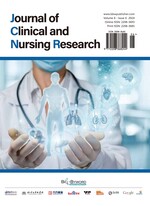Abstract
Objective: To analyze the degree of psychological distress among elderly patients with recurrent trigeminal neuralgia and its influencing factors. Methods: A single-center cross-sectional study was conducted on 126 elderly patients with recurrent trigeminal neuralgia who visited the Pain Department of our hospital from March 2022 to April 2024. Logistic regression analysis was employed to evaluate the factors influencing psychological distress, based on general patient data, the Distress Thermometer (DT), the Perceived Social Support from Family Scale (PSS-Fa), and the Pittsburgh Sleep Quality Index (PSQI). Results: Among the 126 elderly patients with recurrent trigeminal neuralgia, those with a DT score ≥ 4 (72 patients, 57.14%) were more prevalent than those with a DT score < 4 (54 patients, 42.86%). The average DT score for all patients was 4.35 ± 1.72. Patients in the DT score ≥ 4 group were older than those in the DT score < 4 group (t = 4.207, P = 0.000), had lower PSS-Fa scores (t = 5.925, P = 0.000), and had higher PSQI scores (t = 17.858, P = 0.000). There were no statistically significant differences in gender, marital status, residence area, education level, disease type, or pain location (all P > 0.05). Older age and poor sleep quality were identified as independent risk factors for psychological distress in elderly patients with recurrent trigeminal neuralgia (OR = 1.258, OR = 1.713, both P < 0.05), while higher levels of family support were identified as a protective factor (OR = 0.581, P = 0.025). Conclusion: Elderly patients with recurrent trigeminal neuralgia experience psychological distress, and the degree of severity depends on age, quality of sleep, and level of family support.
References
Yang X, Guo C, Ke L, 2023, Effects of Extended Rehabilitation Intervention on Postoperative Mood, Pain, and Recurrence Rate in Elderly Patients with Trigeminal Neuralgia. Geriatrics and Health Care, 29(3): 547–551.
Luo F, Guo X, Zhang J, et al., 2018, Application Study of Acupoint Acupuncture Therapy in Patients with Recurrent Trigeminal Neuralgia Associated with Anxiety and Depression. Chinese General Medicine, 16(8): 1360–1363.
Procidano ME, Heller K, 1983, Measures of Perceived Social Support from Friend and from Family: Three Validation Studies. Am J Community Psycho1, 11(1): 1–24.
Lu T, Li Y, Xia P, et al., 2014, Reliability and Validity Analysis of the Pittsburgh Sleep Quality Index. Chongqing Medicine, 43(3): 260–263.
Xue YX, 2014, Evaluation of Factors Affecting Sleep Quality and Effect of Oxcarbazepine Treatment in Patients with Primary Trigeminal Neuralgia. Modern Instruments and Medical Treatment, 20(6): 105–107.
Niu Y, Liu Q, Liu X, 2018, The Effect of Evidence-Based Nursing on the Treatment of Patients with Primary Trigeminal Neuralgia and its Influence on Patients’ Pain Scores. Shaanxi Medical Journal, 47(4): 543–545.
Kotecha R, Miller Jamodugula S, et al., 2017, Stereotactic Radio-Surgery for Trigeminal Neuralgia Improves Patient-Reported Quality-of-Life and Reduces Depression. Int J Radiat Oncol BiolPhys, 98(5): 1078–1086.
Xie Y, Zhou H, Zhang J, 2018, Research on the Effect of Psychological Intervention on Pain and Sleep in Patients with Primary Trigeminal Neuralgia. Journal of Practical Hospital Clinics, 15(4): 167–170.
Chen J, Fang Y, Zeng Y, 2021, A study of the Effects of Multiple Social Participation and Family Support on the Mental Health of Chinese Older Adults. China Health Policy Research, 14(10): 45–51.
Kong Y-P, Zhang H-Y, 2018, Study on the Relationship Between Mood and Pain Site of Elderly Trigeminal Neuralgia Patients and Their Sleep Quality. Electronic Journal of Clinical Medicine Literature, 5(25): 43–44 + 46.
